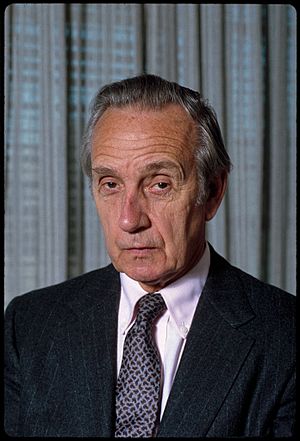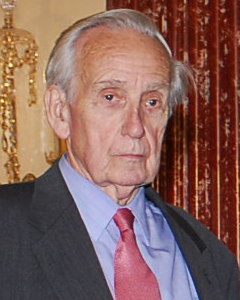Brian Urquhart facts for kids
Quick facts for kids
Sir
Brian Urquhart
|
|
|---|---|

Urquhart at the United Nations
|
|
| Under-Secretary-General of the United Nations for Special Political Affairs |
|
| In office 1972–1986 |
|
| Preceded by | Ralph Bunche |
| Succeeded by | Marrack Goulding |
| Personal details | |
| Born |
Brian Edward Urquhart
28 February 1919 Bridport, Dorset, England, U.K. |
| Died | 2 January 2021 (aged 101) Tyringham, Massachusetts, U.S. |
| Spouse | Lady Sidney Urquhart |
| Alma mater | Christ Church, Oxford |
| Profession | Soldier and diplomat |
| Military service | |
| Allegiance | |
| Branch/service | |
| Years of service | 1939–1945 |
| Rank | Major |
| Unit | Dorsetshire Regiment |
| Battles/wars | Second World War |
Sir Brian Edward Urquhart (born 28 February 1919 – died 2 January 2021) was a British public servant and a veteran of World War II. He also wrote many books. He played a very important part in starting the United Nations (UN). Later, he became the Under-Secretary-General for Special Political Affairs at the UN.
Contents
Early life and education
Brian Urquhart was born in Bridport, Dorset, England. His father, Murray Urquhart, was an artist, and his mother, Bertha Rendall, was a teacher. When Brian was six years old, his father left the family.
He went to Badminton School and then won a scholarship to Westminster School. He later attended Christ Church, Oxford university, but he left when World War II began.
Military service in World War II
When World War II started, Brian Urquhart joined the British Army. He quickly became an officer in the Dorset Regiment in 1940. His unit was part of the coastal defense forces near Dover during the Battle of Britain.
Later, he joined the 1st Airborne Division as an Intelligence Officer. In 1942, he was badly hurt during a training jump. He broke several bones and spent months recovering in the hospital.
After he recovered, Urquhart served in North Africa and the Mediterranean. He then helped plan airborne operations for Operation Overlord (the D-Day landings). In the autumn, he helped plan Operation Market Garden. This was a big airborne mission to capture bridges in the Netherlands.
Urquhart believed the plan had serious problems. He tried to tell his commanders to change or stop the mission. He had important information from air photos and the Dutch resistance. The mission failed, and many soldiers were lost. This proved Urquhart was right. He felt very sad that he could not convince his superiors to stop the operation. He then asked to leave the airborne forces.
After leaving the airborne forces, he joined a special unit called T-Force. This unit looked for German scientists and military technology. Urquhart helped capture a German nuclear scientist named Wilhelm Groth.
In April 1945, Urquhart was one of the first Allied soldiers to enter the Bergen-Belsen concentration camp. What he saw there made him want to work for peace at the United Nations.
Working for the United Nations
In 1945, Brian Urquhart was part of the British team that helped set up the United Nations. He helped create the rules and systems for the new organization. He then became an assistant to Trygve Lie, who was the first Secretary-General of the United Nations. Urquhart helped get the UN started in New York City.
When Dag Hammarskjöld became the second Secretary-General in 1953, he chose Urquhart as one of his main advisors. Urquhart worked closely with Hammarskjöld until Hammarskjöld's death in 1961.
During the Suez Crisis in 1956, Urquhart played a key role in creating the first major UN effort to solve conflicts and keep the peace. Because he was the only main advisor with military experience, Urquhart led the effort to organize the first United Nations Emergency Force. This force was meant to separate Egyptian and Israeli soldiers fighting in the Sinai Peninsula. The UN wanted the peacekeepers to wear blue hats. When blue berets would take too long to make, Urquhart suggested painting regular helmets blue. These blue helmets became a symbol of UN peacekeepers.
In the early 1960s, Urquhart was the main UN representative in the Congo. He worked to bring stability to the country, which was facing many conflicts. He sometimes faced dangerous situations.
From 1972 until he retired in 1986, he served as the UN Under-Secretary-General for Special Political Affairs. In this role, Urquhart managed peacekeeping forces in the Middle East and Cyprus. He also worked on peace talks in places like Namibia, Kashmir, and Lebanon. He also worked on peaceful uses for nuclear energy.
Urquhart wrote an autobiography called A Life in Peace and War. He also wrote several books with Erskine B Childers about how to make the United Nations more effective. He wrote biographies of Hammarskjöld and Ralph Bunche.
Awards and recognition
Brian Urquhart received several important awards. In 1986, he was made a Knight Commander of the Order of St Michael and St George. He was also a member of the Order of the British Empire.
He received the Freedom from Fear Award in 1984. He also got the Distinguished Peacekeeper Award from the International Peace Institute.
To honor his work for the United Nations, the United Nations Association – UK gives out the Sir Brian Urquhart Award every year. This award is for people who have done great service for the United Nations.
A painting of Urquhart by Philip Pearlstein is kept in the National Portrait Gallery, London.
Personal life
Brian Urquhart was not religious. He married Alfreda Huntington, and they had three children: Thomas, Katharine, and Robert. They later divorced. In 1963, he married Sidney Damrosch Howard. She was the daughter of the American writer Sidney Howard. They had two children, Rachel and Charles.
Urquhart wrote essays for The New York Review of Books and his memoir, A Life in Peace and War. He also wrote biographies and books about the United Nations.
Brian Urquhart died at his home in Tyringham, Massachusetts in 2021, at 101 years old. His second wife, Lady Sidney Urquhart, passed away the day after him.
Selected works
Books
- Urquhart, Brian (1972). Hammarskjold. Knopf. ISBN 978-0-394-47960-6. https://books.google.com/books?id=LxVnAAAAMAAJ.
- Urquhart, Brian (1987). A Life in Peace and War. Harper & Row. ISBN 9780060158408. https://archive.org/details/lifeinpeacewar00bria.
- Urquhart, Brian (1 August 1989). Decolonization and World Peace. University of Texas Press. ISBN 978-0-292-71559-2. https://books.google.com/books?id=5tUeDgAAQBAJ.
- Urquhart, Brian; Childers, Erskine (1990). A World in Need of Leadership: Tomorrow's United Nations. Dag Hammarskjöld Foundation. ISBN 978-91-85214-16-7. https://books.google.com/books?id=f3iPAAAAMAAJ.
- Urquhart, Brian; Childers, Erskine (1992). Towards a More Effective United Nations: Two Studies. Dag Hammarskjöld Foundation. https://books.google.com/books?id=qlaPAAAAMAAJ.
- Urquhart, Brian (1993). Ralph Bunche: An American Life. W.W. Norton. ISBN 978-0-393-03527-8. https://books.google.com/books?id=I1j-pA6QrsgC.
- Childers, Erskine; Urquhart, Brian (1994). Renewing the United Nations System. Dag Hammarskjöld Foundation. https://books.google.com/books?id=RPO4AAAAIAAJ.
Lectures
- Reflections on the United Nations: Interviews of Sir Brian Urquhart by Ms. Virginia Morris, Principal Legal Officer Codification Division, United Nations Office of Legal Affairs in the Lecture Series of the United Nations Audiovisual Library of International Law
See also
 In Spanish: Brian Urquhart para niños
In Spanish: Brian Urquhart para niños
 | Selma Burke |
 | Pauline Powell Burns |
 | Frederick J. Brown |
 | Robert Blackburn |


